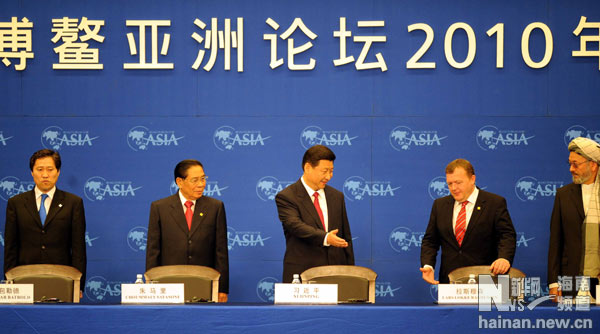Boao forum opens annual session
The Boao Forum for Asia (BFA) Annual Conference 2010 officially opened Saturday morning in Boao in south China's Hainan Province, with a focus on Asia's sustainable recovery from the economic downturn.
 |
|
Boao forum opens annual session,Chinese Vice President Xi Jinping(c) attends the opening ceremony and will soon deliver a keynote speech.[Xinhua] |
?China has been working "actively and seriously" to tackle climate change and build capacity to respond to it, Chinese Vice President Xi Jinping told the opening ceremony.
"We have joined global actions to tackle climate change with the utmost resolve and a most active attitude, and have acted in line with the United Nations' principle of common but differentiated responsibilities," he said in a key-note speech.
He said China's move to speed up transformation of economic growth pattern and adjustment of economic structure is a positive contribution to Asia's and the global fight against climate change.
Xi also called on Asian nations to further open market, firmly oppose all forms of protectionism and "uphold a fair, free and open global trade and investment system."
"Meanwhile, we should give full play to role of regional and sub-regional dialogue and cooperation mechanisms in Asia to promote harmonious and sustainable development of Asia and the world at large," he said.
Long Yongtu, BFA's secretary-general, said the world economy still faces huge challenges despite strong signs of recovery.
The biggest challenge is to ensure quality, efficient and green growth rather than to have only strong economic data, Long said at the opening ceremony.
Fidel Ramos, former Filipino president and outgoing chairman of BFA's board of directors, said all Asian nations should explore different ways on the way to recovery to ensure sustainable growth.
The nations should strive to achieve green recovery no matter how painful the economic transformation is, Ramos said.
For Mongolia, one of the major challenges is to transform an economy with substantial national resources into a green one, said Mongolian Prime Minister Sukhbaataryn Batbold.
Batbold said Mongolia will increase green investment in mining, railway and building sectors and use more environment-friendly technologies.
But he said the country is facing a dilemma of development as Mongolia needs decades to get rid of dependence on fossil fuels.
An additional investment of more than 10 trillion U.S. dollars is predicted to be used globally by 2030 to combat climate change, which means each country must invest one percent of its gross domestic product in this regard, Danish Prime Minister Lars Loekke Rasmussen told the opening ceremony.
Afghan Second Vice President Mohammad Karim Khalili emphasized the importance of regional cooperation in achieving green growth. He said Asian people, socially and culturally linked to each other, should jointly work to address common challenges.
Besides global warming, Khalili said a secure and politically-stable environment is key to economic development. He called for enhanced cooperation on cracking down on terrorism, narcotics and organized crimes.
Some 2,000 political and business heavyweights and experts from Asia and around the world gathered in the island resort for the conference, which will conclude on Sunday.
The BFA, established in 2001, is a pan-Asian platform of dialogue for key issues affecting Asia and the world. The theme of this year's meeting is "Green Recovery: Asia's Realistic Choice for Sustainable Growth."
 0
0 






